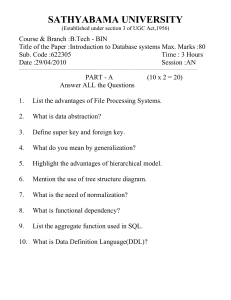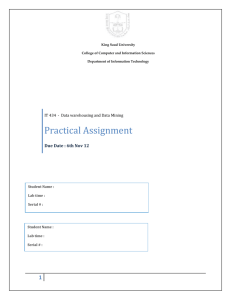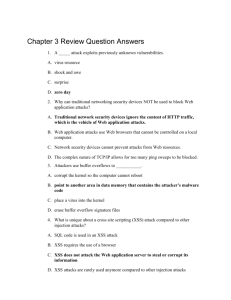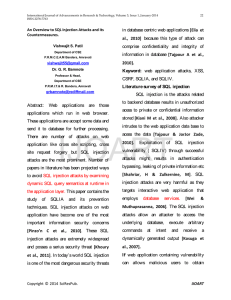REFERENCES Anchila A. and Jain S. ... IEEE International Conference on Recent ...
advertisement
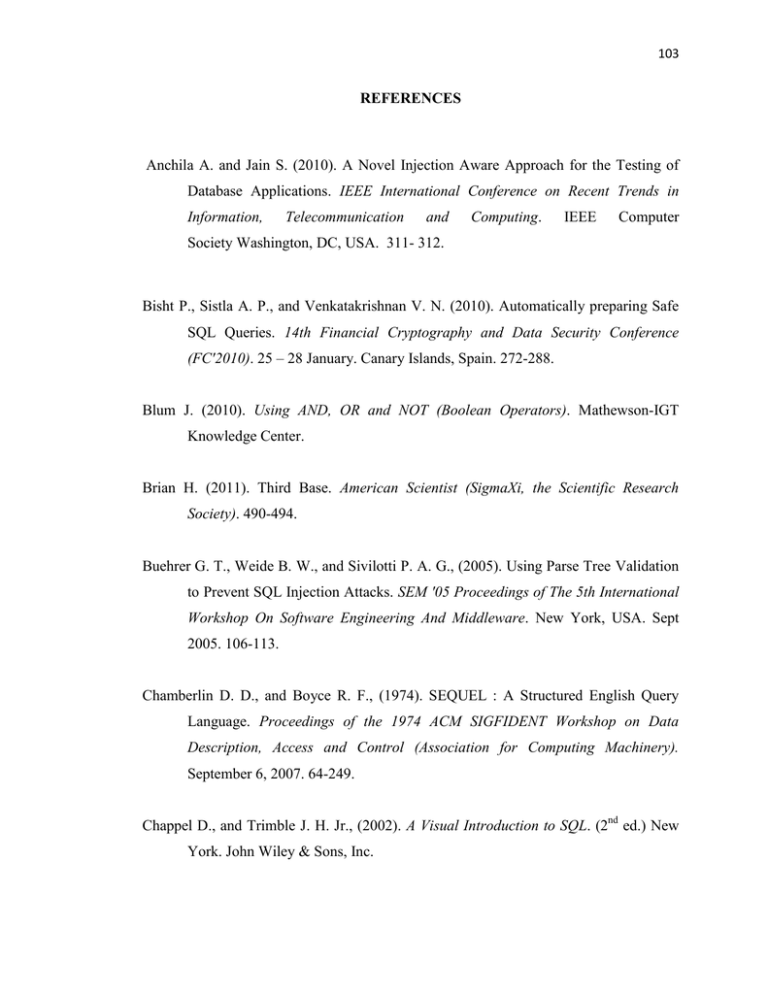
103 REFERENCES Anchila A. and Jain S. (2010). A Novel Injection Aware Approach for the Testing of Database Applications. IEEE International Conference on Recent Trends in Information, Telecommunication and Computing. IEEE Computer Society Washington, DC, USA. 311- 312. Bisht P., Sistla A. P., and Venkatakrishnan V. N. (2010). Automatically preparing Safe SQL Queries. 14th Financial Cryptography and Data Security Conference (FC'2010). 25 – 28 January. Canary Islands, Spain. 272-288. Blum J. (2010). Using AND, OR and NOT (Boolean Operators). Mathewson-IGT Knowledge Center. Brian H. (2011). Third Base. American Scientist (SigmaXi, the Scientific Research Society). 490-494. Buehrer G. T., Weide B. W., and Sivilotti P. A. G., (2005). Using Parse Tree Validation to Prevent SQL Injection Attacks. SEM '05 Proceedings of The 5th International Workshop On Software Engineering And Middleware. New York, USA. Sept 2005. 106-113. Chamberlin D. D., and Boyce R. F., (1974). SEQUEL : A Structured English Query Language. Proceedings of the 1974 ACM SIGFIDENT Workshop on Data Description, Access and Control (Association for Computing Machinery). September 6, 2007. 64-249. Chappel D., and Trimble J. H. Jr., (2002). A Visual Introduction to SQL. (2nd ed.) New York. John Wiley & Sons, Inc. 104 Christiansen S., and Route M. (Ed.), (2005). Database Management System (DBMS). Retrieved September, 2005. from Tech Target Website : http://searchsqlserver.techtarget.com/definition/database-management-system Codd E. F., (1970). A Relational Model of Data for Large Shared Data Banks. Magazine Communication of the ACM – Special 25th Anniversary Issues. Vol. 26 (Issue 1). 64-69. Dolson J. (2004). Working With Boolean Queries in MySQL/PHP. Practical eCommerce Magazine. Elmasri R., and Navathe S. B., (1994). Chapter 11 : The Hierarchical Data Model and the IMS Syatems. Fundamentals of Database Systems. Benjamin / Cummings. (2nd ed.) 343-389. Elmasri R., and Navathe S. B., (1994). Chapter 8 : SQL - A Relational Database Language. Fundamentals of Database Systems. Benjamin / Cummings. (2nd ed.) 343-389. Elmasri R., and Navathe S. B., (1994). Chapter 9 : A Relational Database Management System - DB2. Fundamentals of Database Systems. Benjamin / Cummings. (2nd ed.) 343-389. Healey R. G., (2007). Database Management Systems. In Goodchild M. F., Rhind D. W., and Maguire D. J. (Ed.). Geographical Information Systems : overview, principles and applications. (pp. 251-267). Londan : Longman. Heberling G. (2008). Lesson 5 : Types of Database Management System. Retrieved September 1, 2009. from Penn State New Kensington University Web site : http://www.personal.psu.edu/glh10/ist110/topic/topic07/topic07_06.html 105 Hossain Shahriar and Mohammad Zulkernine. (2010). Taxonomy and Classification of Automatic Monitoring of Program Security Vulnerability Exploitations. The Journal of Systems and Software. Vol. 84 (Issue 2). 250-269. Irving C. (1918). A Survey of Symbolic Logic. Berkeley : University of California Press. 157. Khaleel Ahmad, Shekhar J., Yadav K. P., (2011). Coalesce Techniques to Secure Web Applications and Databases against SQL Injection Attacks. Electronic Journal of Computer Science and Information Technology (eJCSIT). Vol. 3 (No. 1). 26-30. Knuth, Donal E., (1981). The Art of Computer Programming. Reading Mass : AddisonWesley Publishing Company. Vol. 2. 190. Lemon S. (2008, May 19). Mass SQL Injection Attack Targets Chinese Web Sites. PCWorld Communications, Inc. IDG News. Los R. (2011). MySQL Website Hacked (Ironically) by Blind SQL Injection. Infosec Island, LLC. March, 29. Oppel A. (2004). Database Demystified. CA : McGraw Hill Osborne Media. February 2007. 1-90. Partington V. and Xebia E. K. (2005). Top Ten Most Critical Web Application Vulnerabilities. Open Web Application Security (OWASP) Foundation. Patel N., Fahim Mohammed, and Soni S. (2011). SQL Injection Attacks : Techniques and Protection Mechanism. International Journal on Computer Science and Engineering (IJCSE). Vol. 3. 199-203. 106 Ruzhi X., Jian G., and Liwu D. (2010). A Database Security Gateway to the Detection of SQL Attacks. IEEE 3rd International Conference on Advanced Computer Theory and Engineering (ICACTE). 20-22 August. Univ. Beijing, China. 537540. Shah H. (2006). Understanding SQL Injection. Infys Systems. Silveria C., Eloy L., and Monteiro J. M., (2010). A Query Language for Data Access in Ubiquitous Environments. Clei Electronic Journal, Vol. 13. no. 3, paper 2. Skaruz J., Nowacki J. P., and Drabik A. (2010). Soft Computing Techniques for Intrusion Detection of SQL-Based Attacks. ACIIDS’10 Proceedings of the Second international conference on Intelligent information and database systems: Part I. Springer-Verlag Berlin Heidelberg. 33-42. Sushila M. and Supriya M. (2010). Security Standards Perspective to Fortify Web Database Applications From Code Injection Attack. IEEE International Conference on Intelligent Systems, Modeling and Simulation. 27-29 January. Univ. of Delhi, India. 226-230. The Penguin Dictionary of Mathematics. (1998). London, England : Penguin Books. (2nd ed.). 417. The Web Hacking Incidents Database 2008. Breach Security Inc. Annual Report. February 2009. Ulmer C., Gokhale M., and Gallagher B. (2010). Massively Parallel Acceleration of a Document-Similarity Classifier to Detect Web Attacks. Journal of Parallel and Distributed Computing, 225-235. 107 William J. V., Halfond G. J., and Orso A., (2006). A Classification of SQL Injection Attacks and Countermeasures. Proceedings of the IEEE International Symposium on Secure Software Engineering. March 2006. Arlington, VA, USA. Yaashuwanth C. and Ramesh R. (2010). Attacks in WEB Based Embedded Applications. International Journal of Computer Sciences Issues (IJCSI). Vol. 7 (Issue 6). 116-119.
